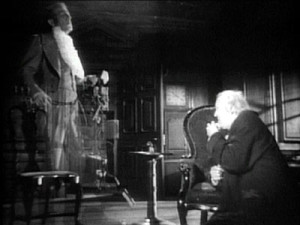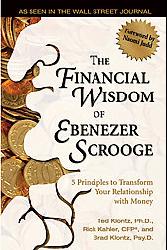As seen in the Racine Journal Times | December 4, 2013
This year marks the 170th anniversary of Charles Dickens’ “A Christmas Carol,” which depicts the transformation of Ebenezer Scrooge after being visited by three ghosts who show him his past, present and future life. Many of Scrooge’s worst qualities stem from his beliefs about money. I think we can all learn something from Scrooge’s experience to understand our own attitudes and beliefs about money.
Prior to being visited by the three ghosts of Christmas, Scrooge is visited by the ghost of his former partner Marley.  Marley initiates the process through which Scrooge will become a radically different person by the end of the book. Left alone, it’s highly doubtful that Scrooge would have ever changed. I suspect a lot of us are similar in our own attitudes and beliefs; without an outside force, what are the chances we’ll change?
Marley initiates the process through which Scrooge will become a radically different person by the end of the book. Left alone, it’s highly doubtful that Scrooge would have ever changed. I suspect a lot of us are similar in our own attitudes and beliefs; without an outside force, what are the chances we’ll change?
Forced to wander the Earth dragging chains, Marley attempted to steer Scrooge in a different direction so Scrooge would not find himself in a similar position. Yet Scrooge’s denial prevented him from seeing Marley’s fate as his future too. How many times are we given the chance to change our behavior around money, but do nothing?
In their book “The Financial Wisdom of Ebenezer Scrooge,” authors Ted and Brad Klontz along with Rick Kahler outline the three conditions necessary for change: recognizing change is necessary; understanding what needs to be done; and committing to making the change.
Marley attempted to help Scrooge recognize the need for change, but it wasn’t until Scrooge was visited by the other three ghosts that all three conditions were present. Nevertheless, Marley initiated the process. He first prompted Scrooge to start asking himself whether he wanted to find himself in the same place. Too often, we’re hindered in achieving success by unconscious beliefs that we’ve never spent time exploring.
 Klontz and Kahler explore many of these beliefs such as “the more money you have, the happier you are” or “there can never be enough money” which certainly applied to Scrooge too. Klontz and Kahler question whether these beliefs contribute to people’s wellbeing or, rather, unconsciously lead to feelings of dissatisfaction and fear.
Klontz and Kahler explore many of these beliefs such as “the more money you have, the happier you are” or “there can never be enough money” which certainly applied to Scrooge too. Klontz and Kahler question whether these beliefs contribute to people’s wellbeing or, rather, unconsciously lead to feelings of dissatisfaction and fear.
Sometimes it takes someone else to show us that the path we’re on will not lead to the outcome we are hoping for. Fortunately Scrooge had his former business partner Marley to help him start the process of positive change. Who’s your Marley?





